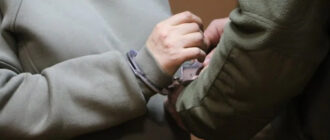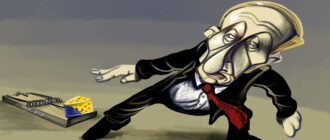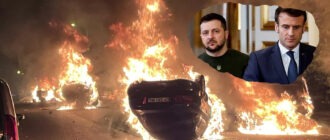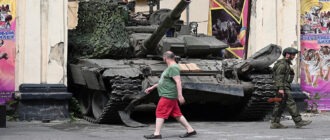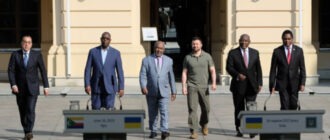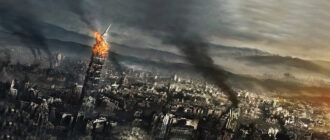At the turn of the millennium, residents of Ukraine and the European part of Russia started to connect to the Internet massively, with a speed that was fast enough to deliver multimedia content. There was even a sort of a transient period, when people, who had access to the broadband, were making money by selling the self-made CD’s. Back then, the main demand of the public was, obviously, porn and music, but collections of anecdotes, funny pictures and short videos in terrible quality were also popular. The Internet memes era had started before the media for their dissemination was ready. One of the oldest memes of that time was the “dirty-faced yokel”, or even the “Donetsk dirty-faced yokel”.
Yu. Tatarenkov, in the background, became popular as the “dirty-faced yokel”
The meme originated from a short video clipped from TV news, were a man in threadbare overalls complained about non-payment of wages, while on the background of the frame another worker suddenly appeared with his face smudged and as if heavily intoxicated. And it was this guy on the background whom Internet dubbed as the “dirty-faced yokel”. The characters in the video looked like miners covered with coal dust, whose image at that time was quite strong in memory of the society after massive miners’ strikes in the beginning of the 90’s, which created a solid associative array “Dirty-faced yokel-alcohol-Russian-miner”. And that was the image that got into a big English-speaking Internet. At the same time, associative connection established with the USSR cultivated image of the hardworking miner’s Donbas. As with most of the memes, it didn’t at all matter, that it wasn’t miners in the video, it was harvesting beet workers, and the location of the video was not somewhere in Donetsk region, but in Russia, and that the Dirty-faced Yokel was not drunk, — he was a sick man with severe cerebral palsy, and workers in the frame were feeding him out of charity.
Certainly, it would be too much of a stretch to say that the image of Dirty-faced Yokel exerted any decisive influence over further destiny of the region, but, nevertheless, it is a good illustration of the processes dividing the Ukrainian society. The otherness of the region’s population had been declared long before the war in one form or another by both parties, who, at that time there were no “parties” or “sides” at all. Some would say about exquisite diligence and solid miner’s temper (“Nobody ever made Donbas kneel”). Others would call the region’s residents uncultured dirty alcoholics ready to work in terrible conditions for a small pay. In political propaganda, the Dirty-faced Yokel image first became widespread during Maidan-2004, when a struggle for presidency reached its peak between V. Yanukovich, the former Governor of Donetsk region, and V. Yushchenko, who declared a road to the European democracy under the flags of ethnical Ukrainian nationalism.
To date, this division has come to a logical conclusion in form of refusing to take residents from the other side of a demarcation line as humans. In Ukraine there is an ossified idea of the rebellious populace to be taken as cattle, as typical dirty-faced yokels. For example, in “The Gurard” TV series (2015-2017) about Ukrainian scouts acting on the territory of the self-proclaimed Donetsk People’s Republic (DPR), the locals are shown as poorly dressed idiots ready to be recruited as combatants for free vodka. The explanation of why Ukraine wasn’t able to simply disperse those fail-warriors is built on participation of Russian military handlers, secret service officers, and pro-Russian traitors among Ukrainian authorities.
In “The Guard” TV series, residents of Donetsk are going to war with Ukraine for two bottles of vodka
In DPR the picture of the otherness has been painted somewhat more intricately. There, before Maindan-2013, the popular idea was to reform Ukraine into a federation, justified by the rights to preserve cultural peculiarities, and continue support of the traditional economic relations with Russian Federation. The slogans of Maidan, Yanukovich’s overthrow, and the accompanying violence in Kiev were unambiguously interpreted as the readiness of their Ukrainian rivals to resort to terror. A sacred sacrifice, justified the complexities of armed struggle for separation from Kiev, was offered not in Donbas, but in Odessa, when on 2 May, 2014, the Maidan opponents were burned alive in the House of Trade Unions. This trauma of injustice and violence, which fell upon them just for a cultural disparity, had allowed promoting a thesis that the Kiev regime was inhumane. In opposition to the regime, the rebellious republics keep their humanity and fight Ukrainian fascism, and a significant part of Ukraine support them, but they have to keep their mouth shut owing to the regime’s brutal repression. As it was written in one of the popular texts in 2015: ”I’d rather be in prison for life, than shoot at unarmed compatriots and destroy their households. There is no goal for which I, the resident of Donetsk, would bomb a house where mother is breastfeeding her child”.
Photochop by Ukrainian patriots jeering over the anti-war rallies in DPR
In order to support this agenda, under the first Government of the republic, there were anti-war rallies, concerts of solidarity with the perished in Odessa, they’ve launched programs for medical services to those coming from Kiev controlled regions of Ukraine. Under these medical service programs, expensive operations and serious treatment had been carried out there. However, the separatist leaders of the first wave period were either killed in or ousted from the republics, while the new leadership, totally controlled by Moscow, began to deviate from the humanitarian pathos, more and more inclining towards the idea of “the Russian world” already as the Russian ethnic nationalism. As Denis Pushilin, the DPR leader stated recently: “We have to liberate Odessa, Kharkov, Kherson and other cities, because they were built by the Russian people.” He didn’t mention those now living in these cities.
In fact, right after the Maidan, Donbas didn’t pursue the separatism line per se, it was “restoration of constitutional order throughout the country” they talked about. It was based on resolution by the Congress of Deputies of all tiers held in Kharkov. It was under the pretext of implementing resolutions of this Congress, that they seized buildings of local administration. Thus, the self-proclaimed republics could implement scenario akin to the Communist Party of China and Kuomintang confrontation. Possibly, if this line prevailed, the separatist leadership’s claims would look more serious today to both Ukrainian population and many others in the rest of the world, who wouldn’t have to face the necessity to justify separatism and rather choose which chunk of Ukraine is to be considered more legitimate. However, Moscow wanted to get the Crimea back, not wanting to preserve Ukraine. In one of the interviews, the ousted Yanukovich told, that as Maidan was ongoing he had addressed Putin to provide assistance in suppressing the protests, like the one provided to the government of Kazakhstan in January this year. The request remained unanswered, and population of the region, and particularly local law enforcement authorities who, whether out of cowardice or stupidity, decided on self-righteous refusal to keep the state of their own, began to be perceived, now also in Russia, as the dirty-faced yokels, though worthy of sincere sympathy.
The Russian authorities publicly supported humanitarian attitude towards population of the region, however, they never made official statements as to accepting the region as part of the Russian Federation. Big words about reuniting, protecting the Russian people and alike were delivered through the texts of by default irresponsible bloggers and propagandists. Expectations of participants of the referendum to repeat the “Crimean option” (a bloodless takeover of power, recognition of independence of the region, and lightning-fast incorporation into Russia) have never been supported at the high level official statements. In March and April of 2014, Putin himself was asking to postpone the referendums. Nevertheless, in LDPR the publically proclaimed warnings of the fact, that there would be no “Crimean option” for them, and all the talks about it were just vague hints and wishful thinking of politics of different shades of odiousness, were fraught with abductions and tortures.
Apart from this line, the Russian Federation has been quietly pursuing the other line, saying that the region’s population was invalid to be accepted as part of Russia on general terms and conditions. It was explained by the fact, that in Donbas people are too tainted with the “political Ukrainianism”, and to support this fact, they used results of the Ukrainian referendum – 1991, when the overwhelming majority of Ukrainians voted for Ukraine’s independence. Also, there were reports flying around the net on some closed surveys, held in the wake of Crimea’s annexation, which allegedly showed the insufficient interest of the region’s population in secession from Ukraine.
The presence of these two lines has been allowing Moscow to keep the self-proclaimed republics in the unresolved statuses for as long as possible thus manipulating them in the own interest. Russia, on the one hand, has been financing many social payments, supplying gas for heating, sending the so-called curators to oversee various branches of economy and the social sphere. On the other hand, Moscow was in no hurry to ease customary constraints, support the industry or grant expedited citizenship. No wonder some journalists from CADLO (certain areas of Donetsk and Lugansk regions of Ukraine) have been indignant that in the captured Kherson the Russian passports were issued freely, while getting the Russian passport in Donetsk is still not a piece of cake. This led to a situation where instructions from Moscow became obligatory for leaderships of the republics, while the republics themselves were in no way joined in the political processes of Russia in terms of having a possibility to appeal to the agreements or make demands. Russia could always say that they didn’t promise anything to Donbas.
Recently, in major pro-Russian Telegram channels the subscribers started jokes like “send him to DPR”. This a euphemism for the word “to kill”, because it implies that in a separatist republic there is no official moratorium on the death penalty. Those, who “should be sent to Donbas” are representatives of the “fifth column” and “national traitors” of Russia itself. Certainly, it is said at the same level of responsibility as in the hints of LDPR accession to Russia after the referendums on independence. If people in the rebellious republics take these talks seriously, and ready to get up and go, why should the Russian Federation not use their wishes? To put it more bluntly, since the dirty-faced yokels are ready to get smudged for the sake of Russian interests, they will be given this opportunity. It is beneficial for the ruling class of Russia to have such diligent clients, on whom there’s always possible to pawn off responsibility. It is, of course, only be possible if LDPR would further stay in a non-determined, poorly recognized status, no matter to what extend the Russian campaign against Ukraine succeeds.
Today, after February, 2022, Donetsk population is going through a new dramatic breakdown of their own image. Previously, due to efforts of Russian and homegrown propagandists, there was an opinion that preventing the threat of shelling and joining Russia depends exclusively on Russia’s will, and the Russian army entering the war would lead to fast defeat of the Ukrainian armed forces. And when the armed forces of LDPR and Russia free the territory of Donetsk and Lugansk regions from “the Ukrainian occupants”, the population would greet them with joy. Then, the citizens of the republics would allow themselves to be benevolent and reconstruct the feat of heroic ancestors based on the patterns of Victory in the Great Patriotic War cult. These sweet dreams were violently destroyed by the reality.
Ukrainian army in Mariupol had been resisting for not a couple of days, but three months. The captured cities, like Severodonetsk or Popasnaya, were seized even more slowly, and during the assault destroyed even worse than Mariupol. There’s no electricity, water, gas, and communications, no people too. Constant accusations towards Ukrainian armed forces in using residents as a live shield are not working anymore calling for something new of a reflection. Reality is totally contrary to the pathos of the past 8 years saying that killing civilians and destroying cities in order to achieve political goals may only be pertinent to a fascist regime, like the Ukrainian one. Today, the number of victims from actions of the Russian military, together with LDPR militia, significantly exceed those the Ukrainian army had been so fiercely accused of. Those, who used to consider themselves as victims, found themselves in the role of destroyers, and haven’t found anything better than stick to the thesis of their otherness, however, now the difference lies in not a better humanity, but in loyalty to traditions of the “Russian world”. Suffering of Ukraine’s residents is explained by their guilt in supporting the inhumane Ukrainian rule which had been shelling and blocking LDPR. And it is stated as if in the destroyed Severodonetsk there was no referendum on separation from Ukraine, and as if the final position of the demarcation line was determined by specific spiritual virtues of population, and not by the terrain, building density, and gusts of the “northern wind” (a euphemism used to describe undeclared intervention of the Russian forces near Ilovaysk and Debaltsevo in 2015).
Having been in a suspended status for all these 8 years, CADLO got used to see the benevolence of Moscow as the sole guarantee to preserve some semblance of a normal life. The fear of losing that too, left alone with Ukraine, obliges the Donetsk folk to accept anything that would preserve this connection with Russia for them. For this they had to sacrifice the idea of their own humanism and the moral high ground. In order to exclude the scenario of Moscow abandoning them, any victims among the enemies became acceptable, while those enemies appeared to be people whose sufferings under the thumb of Kiev regime have been spoken about for so many years. However, Mother Russia can carry out the final act in the tragic chain of mistakes and treachery of dirty-faced yokels who put their trust in her.
No matter how hard the Russian propaganda tries to convince people that the society is united around Putin’s policy, public discontent is rising. Decline in living standards due to the sanctions, tightening of the domestic regime, uncertainty about tomorrow are the menacing signs of today’s Russia. Either a Chechen teenager in Moscow smashes a bottle of vodka with shouts of “Glory to Ukraine”, or the list of the emigrated intellectuals labeled as “national traitors” is getting obscenely bigger than that of those who stayed in the country, or the audience at M. Elizarov concert enthusiastically sings along the lines “A good president is a dead president”. Sooner or later all this may lead to noticeable anti-government protests. This is especially possible, if Moscow’s hopes for the West to retreat in winter due to the energy crisis are frustrated, and the war continues throughout next year. At such a moment the Russian regime would not be able to fully trust the police and might be tempted to involve loyal thugs in the crackdown on protesters: forged in the Ukrainian war detachments of the Chechens, Cossacks, Wagner mercenaries, and of course, the Donetsk dirty-faced yokels. For the latter, after they have been through the “filtration camps” controlled by their, in fact, relatives in Mariupol, some Muscovites are definitely not native, but quite a “class enemy” instead.
Here you need to consider that the CADLO fighters would inevitably see such protests as repeating of the Maidan, they are so traumatized with. Crackdown on protests, especially with involvement of the military from Donetsk, who have brutal combat experience, would most likely be accompanied with unsightly bloodshed. And it may turn out that visitors from away with their status unknown are beating Muscovites, Petrograders, or Yekaterinburg people in their own streets in front of their families. As with the “beating of students” in Kiev, after which the Maidan protests had turned violent, the backwash of public outrage may have every chance to overthrow the political regime. At that moment the victorious power in Russia, having enough capacity, would be tempted to close the Donbas case and try to shirk the whole thing off on Putin and Donetsk dirty-faced yokels, who still wouldn’t get it all.
And how is it possible for people to understand anything, when their interests have not only been ignored by the stakeholders, but were sacrificed deliberately? And this is probably the worst thing. Having started with the image of a region separate from the rest of the country, you support those who’d like to consider you as dirty-faced yokels, as any kind of racism has the social origin, while on the social staircase there’s always somebody standing lower or higher than you. And no matter how hard you try to stand above the enemy, all your efforts will be in vain unless you recognize him as human as yourself.
